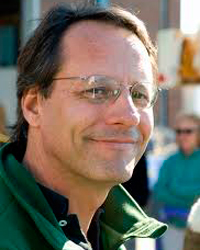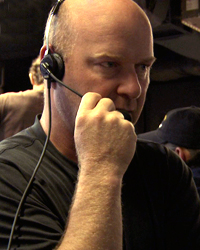 Dr. Timothy Shank
Dr. Timothy Shank
Dr. Timothy Shank, an Associate Scientist in the Biology Department at the Woods Hole Oceanographic Institution, will oversee data collection and analysis, including molecular phylogenetic, phylogeographic, and population genetic analyses, as well as interpretations and publications on the connectivity of invertebrate coral associates across hard-bottom habitats. Dr. Shank is one of very few people who combines multiple molecular genetic approaches and ecological field studies to understand the conditions and adaptations that allow various species to migrate, evolve, and thrive in deep-sea habitats, including chemosynthetic, seamount, and cold-water coral ecosystems. Dr. Shank received his undergraduate degree in Biology and German from the University of North Carolina at Chapel Hill, worked two years with award-winning papers in genetic toxicology at the Environmental Protection Agency, and received a PhD in Ecology and Evolution from Rutgers University in 1998. Over the past 10 years, he has published more than 50 peer-reviewed papers with a specific focus on understanding the ecological and evolutionary factors that affect the structure and evolution of populations of diverse deep-sea species. His expertise in marine phylogenetics and phylogeography have shaped our views on how deep-sea fauna have radiated and evolved in relation to geologic history and chemosynthetic habitat availability on mid-ocean ridges and continental margins. As a Fellow of the Deep Ocean Exploration Institute, his genetic approaches to understanding evolutionary processes that drive patterns of diversity and connectivity in coral ecosystems have led to burgeoning insights on the co-evolution and co-dispersal of coral hosts and their invertebrate associates. This research has been driven both by the model system that coral hosts and associates provide for fundamental evolutionary biology and by the need to understand the impacts and sustainability of deep-sea fisheries and increasing mineral exploration activities on these deep-water faunas. Tim was also co-lead investigator and science advisor to the construction of the hybrid remotely-operated vehicle Nereus. He was integrally involved in developing the scientific capabilities and readiness of the full ocean depth (11km) hybrid ROV/AUV Nereus. Beginning with participating in the initial field programs (May 2009) to the Mariana, Tim will conduct research exploring the extent to which hadal and trench depths and topography promote the formation of species. http://www.whoi.edu/science/B/people/tshank/
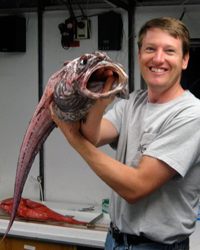 Dr. Jeff Drazen
Dr. Jeff Drazen
Dr. Jeff Drazen is an Associate Professor at University of Hawaii, Manoa. His research focuses on the energetics and feeding of deep-sea fishes and other animals. His work has characterized abyssal fish feeding habits and evaluated their metabolic rates through in situ experiements. His work also uses a variety of biochemical approaches to study food webs in a variety of habitats including the abyssal plain. Jeff has participated in 49 research cruises (11 as chief scientist) including dives with the Alvin and Pisces submersibles and Jason, Tiburon and Ventana ROVs.
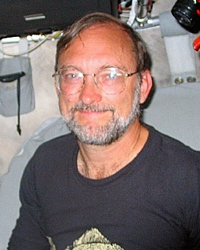 Dr. Paul H. Yancey
Dr. Paul H. Yancey
Dr. Paul H. Yancey is Professor and the Carl E. Peterson Endowed Chair of Sciences at Whitman College (Walla Walla, Washington, USA), where he teaches undergraduate courses in marine biology (for both biology and non-science majors), animal physiology, bioethics (including environmental ethics), and directed research. He has also worked during summers and sabbaticals at Scripps Institution of Oceanography, Oregon State University’s Hatfield Marine Science Center, the National Institutes of Health [medical research], the Mount Desert Island Biological Laboratory (Maine), Stanford University’s Hopkins Marine Station, Louisiana State University, the University of Otago (New Zealand), University of Hawaii’s Oceanography Dept. and Institute of Marine Biology, and the Monterey Bay Aquarium Research Institute. Paul studies biochemical and physiological adaptations of marine animals to physical and chemical factors, specifically water and osmosis, pH, temperature, hydrogen sulfide and hydrostatic pressure. Since 1983, he has gone on numerous deep-sea expeditions using nets, ROVs and the Alvin submersible to collect animals. His specific deep-sea research includes tissue compositions and buoyancy of midwater and bathypelagic fishes, and organic osmolytes in shallow, bathyal and abyssal fishes (hagfish, sharks and their relatives, and bony fish), corals, crustaceans, annelids and echinoderms. Organic osmolytes were originally discovered as small cellular solutes that prevent osmotic shrinkage in most marine organisms, which are faced with the high–and thus potentially dehydrating–salt content of seawater. Paul and other physiologists have found that many of these (and related) compounds have other protective roles. One of these discovered by Paul and his students is the protection of proteins from the inhibitory effects of high hydrostatic pressure in the deep sea. This new mechanism to explain how life can cope with pressure will be tested at extreme depths in the HADES project. Related projects include potential protective roles of osmolytes with respect to sulfide and temperature stresses at cold seeps and hydrothermal vents. Finally, his work on osmolytes in sharks led to i) the use of certain osmolytes in biotechnology for stabilizing biomolecules, and ii) the discovery that mammalian kidneys use the same kind of solutes to protect their cells from the stresses of processing salts and waste products; and as a result, Paul has also worked extensively with medical researchers.
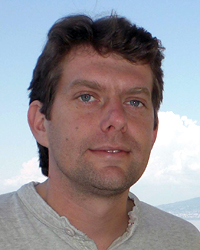 Dr. Alan Jamieson
Dr. Alan Jamieson
Dr. Alan Jamieson is a lecturer in Marine Biology at the University of Aberdeen’s Oceanlab. He coordinates the HADEEP projects which since 2006 has completed 10 research expeditions to 6 hadal trenches around the Pacific Rim. HADEEP1 was funded by the Nippon Foundation (Japan) and NERC (UK). He is also the Principle Investigator of HADEEP2 (2011-2013) funded by the Total Foundation (France). His research focuses on the use of free-fall baited landers and traps to investigate species composition and distribution of bait-attending fauna at hadal depths. He has published 39 peer-reviewed scientific papers in 10 years (including 14 papers relating to hadal biology) and completed 39 research cruises.
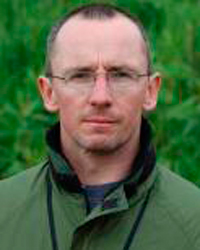 Dr. Stuart Piertney
Dr. Stuart Piertney
Dr Stuart Piertney is the Director of the Institute of Biological and Enviornmental Sciences at the University of Aberdeen, and a Reader in molecular ecology and evolution. He has over 20 years experience using molecular genetic techniques to address fundamental questions in ecology, conservation biology, population genetics and evolution. Studies have being undertaken at all levels of the evolutionary hierarchy – from identifying the phylogenetic relationships among taxa, resolving patterns of phylogeographicand population genetic structure within species,determining relationships among individuals within populations,and the dynamics of specific genes. He has secured over £2 million pounds of competitively awarded research funding from research councils, government, NGO’s industrial and charitable sources. He has published over 85 articles in peer-reviewed journal, attracting over 1750 citations, and sits on the editorial boards of three international journals (Journal of Animal Ecology, Conservation Genetics and Journal of Evolutionary Biology). A current research focus is on using emerging post-genomics technologies to examine genome-wide signatures of adaptation to deep sea environments, and levels of contemporary and historical genetic connectivity among hadal trenches across multiple amphipod species.
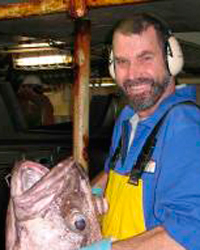 Dr. Malcolm R. Clark
Dr. Malcolm R. Clark
Dr. Malcolm R. Clark is a Principal Scientist at the National Institute of Water and Atmospheric Research (NIWA) in New Zealand. He is a deepwater fisheries scientist, but in recent years his research has broadened to deep-sea ecology, and the effects of human exploitation, especially on seamounts. He is the lead PI on a “Vulnerable Deep-Sea Communities” project (NZ$650,000 per annum 2009–2015), which is investigating the biodiversity of various deep-sea habitats (seamounts, ridges, hydrothermal vents, cold seeps, canyons and continental slope) around New Zealand and implications for effective management of human activities (fishing, seabed mining). He also led the Census of Marine Life programme on seamounts from 2005 to 2011. He has worked extensively in the Kermadec region, assessing deep-sea fisheries for orange roughy, describing deep-sea fish communities, and the ecology of seamounts and hydrothermal vents. He has published 65 peer-reviewed papers, and over 75 technical reports and articles. He is currently co-editing a book to be published by Blackwells on Methods of sampling in the Deep Sea.
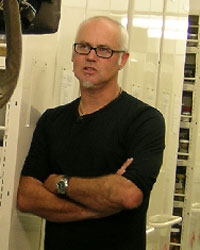 Dr. Ashley Rowden
Dr. Ashley Rowden
Dr. Ashley Rowden is a Principal Scientist for marine benthic ecology at the National Institute of Water & Atmospheric Research in New Zealand. Since joining NIWA in 2001 his research has focused on the ecology of deep-sea communities at a variety of habitats including seamounts, vents, seeps, canyons and trenches. He has successfully obtained research funding from a variety of national and international funding agencies. Ashley was a co-Principal Investigator for the Census of Marine Life international project CenSeam that was based at NIWA. He was a project leader for NIWA’s ‘Seamount ecosystems’ programme (ended in 2009), and is a project leader for NIWA’s current ‘Impacts of human activities on vulnerable deep-sea communities programme’ (2009-2015). Ashley has participated in >35 research cruises (10 as voyage leader or chief scientist), including one to the Kermadec Trench in 2010. He has published 71 peer-review scientific papers (including 1 on hadal ecology). Ashley is an associate editor of the journal Marine Ecology. He has mentored 3 post-doctoral fellows, supervised 8 PhD students and is currently supervising another two.
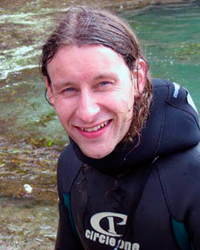 Dr. Daniel J. Mayor
Dr. Daniel J. Mayor
Daniel J. Mayor is an Independent Research Fellow, funded by the Natural Environment Research Council, UK (NERC; NE/G104744/1). He is based at Oceanlab, University of Aberdeen. Daniel’s work examines elemental cycling in a diverse range of planktonic and benthic ecosystems. He is currently investigating how climate-driven changes in the quantity and quality of organic substrates influence the fate of carbon and nitrogen in bacterial and macrofaunal communities found in deep-sea, Arctic and estuarine sediments. He has worked extensively with fatty acid biomarker techniques: Most recently he has used these in combination with compound-specific stable isotope analyses and statistical modelling to investigate the factors influencing the growth efficiency of deep-sea benthic bacterial communities. Daniel has written/contributed to major, successful grant applications funded by NERC (NE/G104744/1), the Leverhulme Trust (F/00152/T), the Research Council of Norway (ES452476) and NERC LSMSF (EK116-11-07; LSMSFBRISTOL022). His work is published in peer-reviewed journals and general interest magazines. Daniel is a Subject Editor for OIKOS and a Copy Editor for Ocean Challenge, the science magazine of the Challenger Society for Marine Science, UK.
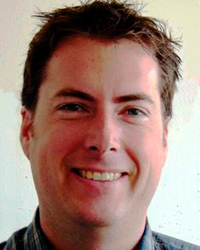 Dr. Henry Ruhl
Dr. Henry Ruhl
Dr. Henry Ruhl is a Head of the DeepSeas Group at the National Oceanography Centre (NOC), UK. Currently he is PI for an Natural Environment Research Council (UK) project Autonomous Ecological Surveying of the Abyss (AESA). His scientific contributions have outlined links between changes in climate conditions and subsequent changes in surface productivity, food fluxes into the deep-sea, and the response of abyssal fauna to those fluxes in terms of distribution, abundance, and community structure in photographic and sediment samples. Ruhl has worked on projects funded by the US National Science Foundation, the David and Lucille Packard Foundation, BP, NERC, and the European Commission, and reported results in peer-reviewed publications, as well as web, print, radio, and TV media. Ruhl has also served as Science Objectives and Observatory Design workpackage leader for the European Seas Observatory NETwork (ESONET) Network of Excellence, and is a member of the Deep-ocean Environmental Long-term Observatory System (DELOS) project, a collaboration between deep-sea researchers and industry.

